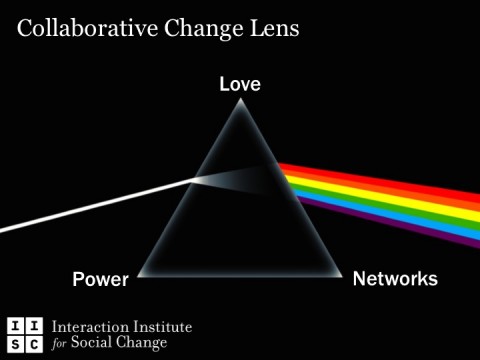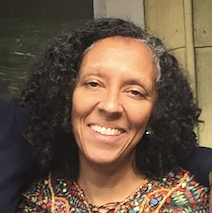Tag Archive: love
June 16, 2016
As I walked into the office on Monday morning – pit in my stomach, swollen eyes from too much crying, exhausted from a restless night – I wondered how we would process the horror that had happened in Orlando over the weekend. I knew we would; after all, this was an organization full of facilitators whose values statement and change lens both included the word love. But having joined barely two weeks prior, I didn’t know just how it would happen.
Our colleague leading the extended meeting scheduled for that morning made it clear from the start: today wasn’t business as usual. And, it wasn’t a day off either. It was a day to be together, to mourn, to process, to do some work, and to practice “community care instead of just self care.” Read More
June 7, 2016

re·gen·er·a·tion
rəˌjenəˈrāSH(ə)n/
Renewal, revival, restoration; spiritual transformation; an aspect of living systems without which there would be no life; a process through which whole new organisms may be created from fractions of organisms; an adaptive and evolutionary trait that plays out at different systemic levels.
Readers of this blog know that at IISC we do not see building networks simply as a tactic, rather networks are more fundamental as structures underlying healthy living systems (ecosystems, human communities, economies, etc.). This is especially true when there is focus on the regenerative potential of social-ecological networks. That is, in paying attention to qualities of diversity, intricacy and flow in network structures, people can support systems’ ability to self-organize, adapt and evolve in ways that deliver vitality to participants and to the whole.
In my conversations with the Research Alliance for Regenerative Economics, we have been developing a list of design principles for and indicators of the human factors in healthy (regenerative) networks. Here is a working list of 12 and readers are invited to offer adjustments, additions, and comments: Read More
December 11, 2015

The following is Christine Capra’s thoughtful response to my post on “Deepening Network Practice for Social Change.” Christine is a self-described network mapper, weaver, and guardian with Greater Than the Sum. NOTE: Text that is bolded represents my additions and editorial changes to the original.
She writes:
I spend a lot of time pondering the above questions [see post] as well, and appreciate your thoughts here. It’s very helpful.
Re: ‘going beyond abstraction to interaction’, Yes! And even further than interaction – in the past year or so, I’ve developed a deep appreciation for something June Holley said to me awhile back – ‘I always say – start with micro-collaborations.’ Read More
December 8, 2015

Last week, we held an internal learning session for staff and affiliates entitled “Advancing Equitable Networks.” IISC Affiliate Kiara Nagel and I presented some thoughts about our ever evolving practice of supporting network development for social change, including situating our current approach in IISC’s mission and vision, and our collaborative change lens (see above), which lifts up the importance of understanding and shifting power dynamics for equitable outcomes, embracing love as a force for social transformation and seeing networks as the underlying infrastructure of change.
We then elicited and shared some questions that are at the growing edge of our network consulting practice, including these three: Read More
March 12, 2015
“We add value to society-at-large when we dare to connect.”

This week I was in a conversation with someone who asked me what the difference is between “networking” and “network building.” I’ve been asked this before, and certainly do not purport to have the right answer, but it became an opportunity to deepen the conversation that has been evolving in my work and head about what it means to develop potential through and in networks. Here is what popped to mind as a response, actually in the form of a series of questions
Are you thinking about others?
Read More
December 18, 2014
“The way of the Essentialist means living by design, not by default.”
– Greg McKeown

I’m currently reading Greg McKeown’s book Essentialism: The Disciplined Pursuit of Less, which I’ll admit I had been tempted to look at earlier in the year and then decided not to for a couple of reasons. First of all, to me the sub-title smacked of a certain level of privilege, given that there are so many people who need more not less – more resources in the face of poverty, more fundamental regard for their humanity and rights in the face of injustice. In addition and seemingly validating of my initial wariness, the book’s opening stories focus on Silicon Valley executives and other corporate players. And yet at the same time I was pulled in by this notion of “essentialism,” embodied in one of the opening quotes attributed to writer, linguist and inventor Lin Yutang:
The wisdom of life consists in the elimination of non-essentials.
Read More
December 3, 2014
“We need to reach out to one another from a perspective that makes group membership less determinative of opportunity and more related to enhancement of self and community. We need to increase our sense of abundance and improve our sense of well-being, as individuals and in relation to one another. “
– john a. powell, Racing to Justice

I’ve had a number of conversations lately about mindsets and how they relate to effective collective and net work, especially work for justice. Most recently I had the opportunity to talk to Jim Ritchie-Dunham of the Institute for Strategic Clarity about his research into “thriving” organizations and communities in a number of diverse settings – sectors and countries. What he has noted as a shared and distinct (though surely not entirely sufficient) difference-maker for these groups is an orientation towards abundance.
Jim has recently published a book entitled Ecosynomics, which is also the name of a field he has helped to found, which looks at “the principles of collaboration” and more specifically, “the principles of abundance.” Research from Jim and his colleagues shows that even amidst what may appear to be a scarcity of resources and hope, some groups thrive in large part through the conscious construction of “agreements” that can create more opportunity.
I have questions and look forward to further conversation with Jim about the starting point of these groups and the degree to which dynamics of power and privilege come into play with respect to their respective successes and who ultimately benefits. At the same time, I have been aware in my work how much of a difference it can make for groups to be conscious of their ability to choose how to be with one another, and how this can help get beyond otherwise self- and collective-limiting behavior. Read More
September 10, 2014

Photo by Guy Renard 25
My friend Joel Glanzberg is a constant source of provocation and insight. The way he sees the world, through a living systems and pattern-seeking lens, is not only refreshing but unnerving in that it is evident how simultaneously critical and rare his perspective is. Joel is great at helping me and others to see beyond objects and structures to underlying patterns and processes, and how these are what animate living systems. Read More
July 18, 2014

We partnered with a foundation as they built a network of leaders who shared a deep passion for their city. In the beginning, many of the leaders wanted to do something together quickly. We encouraged them to pause, build deeper relationships, and see what emerged. Read More
July 8, 2014

Photo by Leland Francisco
Over the past 8 years at IISC I have seen and experienced some interesting progressions. When I first joined the organization, in our Facilitative Leadership trainings, we talked about the “interior condition” of effective collaborative leaders. At the core we mentioned that these leaders and change agents embraced an ethic of “service, authenticity and respect.” Then we made the bold move of changing “respect,” which came across to many as a bit weak, to LOVE. For the first couple of years after making this switch, when I asked “What’s love got to do with it?” with respect to effective leadership and work for social change, there were often uncomfortable silences. Some participants would ultimately want to reframe love as “respect” or “passion.”
Then in 2009 I started noticing a change. More heads nodded in rooms when I mentioned the “L-word.” Less nervous laughter and shifting in seats. In one particularly striking instance, during a training with health care professionals in Maine, a senior and very respected physician responded,
“What’s love got to do with it? Everything! Beyond my technical skills, I am effective in so far as I am able to really see my patients, students, and colleagues, to make them feel seen for who they are.”
Read More
June 23, 2014
Check out the ways that love of her many identities frees up spoken word artist Jamila Lyiscott to be her full self. She reminds us that a full, loving embrace of yourself and your cultures enables others to see you more fully and embrace all of your cultures, while it makes space for others to do the same for themselves. That’s change making at a personal level that can radiate outward to the entire community. Read More
June 20, 2014
The settlement of the case of the Central Park 5 is a great day for the five individuals, add a great day for the cause of racial justice. The case of Antron McCray, Raymond Santana Jr., Kevin Richardson, Yusef Salaam and Kharey Wise is a textbook case of structural racism: implicit bias, coupled with strong-arm institutional police practices used against young men of color, and a media too eager to believe the hype, leading to the conviction of five innocent young black men for a horrendous crime. The documentary about these young men, by Ken Burns, captures the intense impact of the wrongful accusation and imprisonment on the lives of the five young men and their families. Read More











